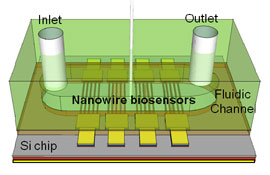Jul 26 2010
UT Dallas nanotechnology researcher Walter Hu has received a $400,000 grant to develop an innovative and manufacturable nanoelectronic biochip that can detect individual molecules.
“The motivation for this project came from a growing synergy between biology and electronics,” said Hu, an assistant professor of electrical engineering in the Erik Jonsson School of Engineering and Computer Science.
“In the long run, improved electronic sensors could have a considerable impact on a wide-range of disease diagnostics, in particular for point of care or future home diagnostics, overcoming the limitations of today’s optical sensors, which require bulky and expensive equipment, complex sample preparation and long processing times,” he added.
 The biosensors being explored would be able to identify an individual molecule, enabling detection of cancer and other diseases at an early stage in their development.
The biosensors being explored would be able to identify an individual molecule, enabling detection of cancer and other diseases at an early stage in their development.
Funding comes from the National Science Foundation (NSF), which accorded Hu one of its prestigious Faculty Early Career Development (CAREER) Awards, the fourth received by UT Dallas engineering and computer science faculty in the past two years.
Hu’s team aims to develop a comprehensive understanding of electronic biosensing mechanisms, sensitivity and bio/non-bio interfaces down to the single-molecule level using silicon nanowire technology incorporated into standard semiconductor electronics.
“We’re investigating two basic performances for these silicon nanowires: the sensitivity and the selectivity of the sensor,” Hu said. “For example, if you’re trying to detect cancer at its early stage, the targets related to it have a very low concentration in blood. That requires the biosensor to be extremely small so it can be highly sensitive. The ultimate in sensitivity is the ability to detect a single molecule. At the same time, because you have a lot of other substances in a blood sample, you want to make your sensor selective enough so that you pick up the right target.”
Hu hopes his research will also make an important contribution to nanotechnology education. One unique feature of the educational component he proposed to the NSF was to deliver biosensing discovery kits based on the results of the project’s research. These kits could be mass-produced and distributed to K-12 schools and community colleges.
“The learning curve on these simplified and inexpensive learning kits would be much less steep than starting from scratch in a lab,” Hu said. “Students who had access to them would be able to explore applied biotechnology much more readily than they are able to now.”
NSF CAREER awards are part of a highly selective program for junior faculty members who are considered likely to become leaders in their field.
“The CAREER program is extremely competitive, and this award recognizes Walter’s innovative research and his potential to become a top researcher,” said Mark W. Spong, dean of the Jonsson School and holder of the Lars Magnus Ericsson Chair in Electrical Engineering.
Hu’s project was jumpstarted two years ago with funding from Texas Instruments for collaborative work he performed with Dr. Jinming Gao and Dr. Baran Sumer at The University of Texas Southwestern Medical Center and Dr. Moon Kim at UT Dallas.
Source: http://www.utdallas.edu/